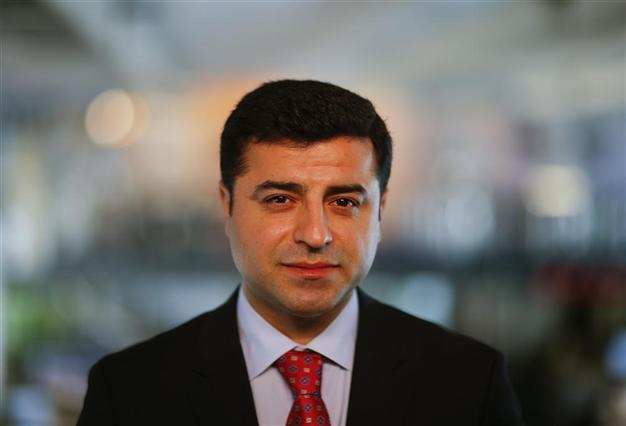PKK withdrawal may be complete by autumn: BDP co-chair
BERLIN - Reuters

Selahattin Demirtaş, co-chairman of the Peace and Democracy Party (BDP) answers a question during a Reuters interview in Berlin April 15, 2013. REUTERS/Pawel Kopczynski
Peace and Democracy Party (BDP) co-chair Selahattin Demirtaş said on Monday it would be difficult for Kurdish militants to disarm before leaving Turkey under the peace process, stressing that the key issue was that they depart peacefully without contact with the Turkish military.Turkish Prime Minister Recep Tayyip Erdoğan's government is seeking a weapons-free pullout by militants of the Kurdistan Workers Party (PKK), as part of a drive to end the three-decades long conflict. The militants themselves however have expressed concern that they could be vulnerable to attack. Hundreds were killed in clashes with security forces in a previous withdrawal in 1999.
"Prime Minister Erdoğan says disarmament must occur but even he knows that is technically impossible. He says, 'Leave the weapons in a cave or bury them, do whatever you want,' but who will regulate this?" Selahattin Demirtaş, co-leader of Peace and Democracy Party (BDP), told Reuters in an interview during a visit to Berlin.
"So we shouldn't get too hung up on this issue, and it appears that the government won't turn this into a crisis."
So far, the issue of disarmament has been the sticking point in the peace process. The PKK has said its forces will not withdraw as Erdoğan has demanded.
The PKK declared a ceasefire with Turkey last month, in response to an order from their jailed leader Abdullah Öcalan, after months of talks with Ankara. The next step is a pullout of an estimated 2,000-2,500 militants from Turkish territory to bases in the mountains of northern Iraq.
Demirtaş said hopes for the peace process remained strong despite some hitches.
Only Öcalan and a few Turkish officials have direct knowledge of the peace plan, communicating through letters.
Demirtaş said two BDP lawmakers had collected a new letter from Öcalan on Sunday, which was now with the Turkish Justice Ministry. That letter, which includes the details of the withdrawal, would also go to PKK leaders in northern Iraq, who would then write an answer to Öcalan and the Ankara government.
Öcalan could then make an announcement in the next week to 10 days, he said.
"If this begins in 10 days, then I think that by autumn we will see most of the withdrawal complete," he added.
Questions of disarmament and reintegration of combatants have tested peace efforts from Northern Ireland to South Africa, often proving extremely difficult to solve due to the amount of distrust on both sides.
Foreign mediators could be brought in to oversee disarmament and reintegration, as happened in Northern Ireland in the run-up to the 1998 Good Friday Agreement which ended three decades of violence that cost 3,600 lives.
Three-stage plan for peace
Demirtaş said the peace plan comprised three stages, first a withdrawal, then legislative changes and a third stage that would include political talks and "normalization."
"The second phase is critical for the settlement. During that time the government must take certain steps for democracy in Turkey and the rights of Kurds. In particular the legal articles in the constitution which deny the Kurds' [existence] must change," he said.
New charter should not define all citizens as 'Turks'
The government has pledged to draw up a new constitution to replace a charter drawn up 30 years ago under military rule. But a parliamentary commission working on the draft has been unable to agree on many of the key issues, delaying the process by months. The BDP's support could break the deadlock.
Asked about the constitution, Demirtaş said the BDP had four key demands. It must not define all citizens as "Turks" as at present, it must grant citizens the right to education in their mother tongue, recognize Turkey's diversity and include a right to some form of communal self-administration.
Demirtaş urged Ankara to expand democratic rights and freedom of expression and to boost financial support for opposition parties. He also urged the government to limit the scope of anti-terror laws, often used to incarcerate Kurdish politicians and close down Kurdish political parties.
"Police and authorities' treatment of demonstrators needs to be overhauled ... We need measures to free the politicians and mayors who are incarcerated and political prisoners," he said.
















